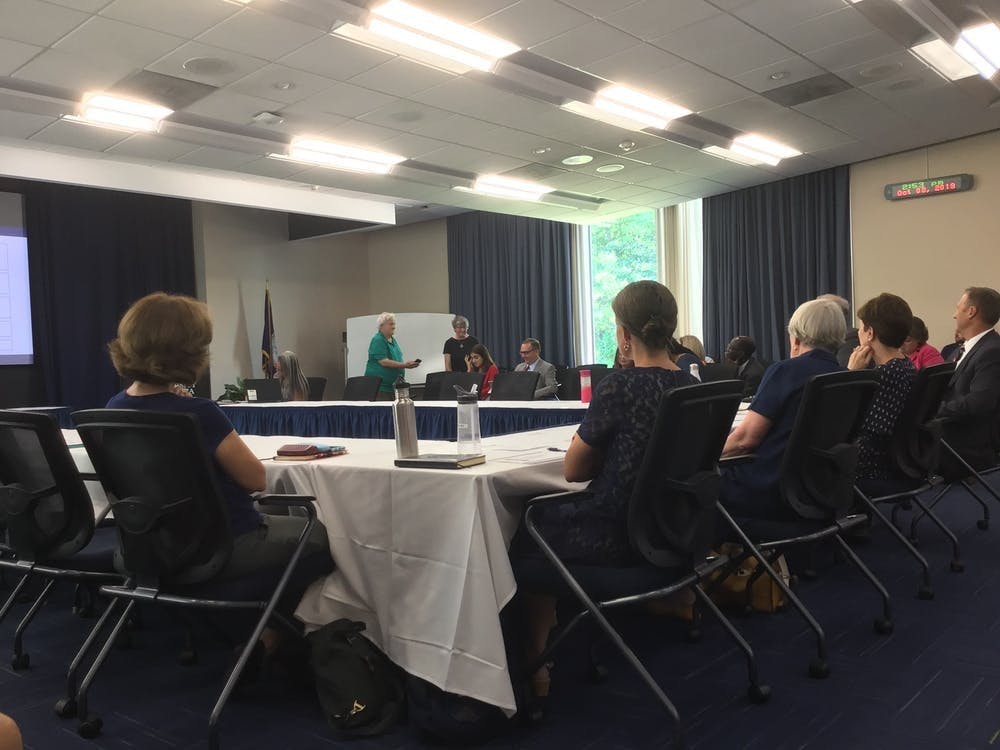Earlier this month, the Charlottesville Planning and Coordination Council began discussion concerning the first steps to dissolve and redesign the organization. The group, organized 33 years ago, was created to “encourage collaboration between Charlottesville, Albemarle County and the University of Virginia” on matters pertaining to land-use policies in the community. The newly revamped council, which will be called the Land Use and Environmental Planning Committee, would remove elected officials from the group and replace them with city- and county-appointed staff members.
As it is now, the council is comprised of the city manager, county executive, two members of the Charlottesville City Council and the Board of Supervisors and two University of Virginia administrators. Seven appointed officials from the Charlottesville and Albemarle will replace them if the new plan is approved — this revised group notably features no representatives from the University itself. Additionally, the LUEPC will include the U.Va. Foundation and the Rivanna Water and Sewer Authority. While it is important that experts are providing input on such vital issues, the community should still be able to voice its concerns over how its land is used and developed. However, this goal is achieved most effectively if elected officials continue to serve on the council.
When discussing the PACC it is essential to note the importance of the organization. The PACC examines a wide range of issues that affect the Charlottesville area. For example, the council has discussed plans to make Charlottesville more pedestrian friendly, to better fund public transportation and to address local housing issues. Additionally, the University voluntarily submits all of its contrusticion plans to the committee for review. Therefore, the PACC helps shape the Charlottesville and University areas in ways that are integral for residents to commute and live comfortably.
There has already been some criticisms of the plan to redesign PACC. For example, a local environmentalist group voiced concerns about the transparency of the proposed council. Specifically, Sean Tubbs of the Piedmont Environmental Council, noted that, “the work of the new body will not be subject to open meetings laws. That means people will not be able to verify the minutes, see agendas in advance, or participate in any meaningful way.”
Therefore, despite any meaningful change that the LUEPC could create, it could still be closed off from Charlottesville residents consider to be their priorities and how they feel about certain projects that the council could put forth. Since the development of land is very important for Charlottesville residents in need of more affordable housing, the PACC’s constituency deserves to know when significant issues are being discussed and provide meaningful feedback.
Facing its own housing crisis, how the Charlottesville area uses land is critical for those in need of low-income housing. The planning council has discussed potential solutions to Charlottesville in the past. These discussions revolved around a 2009 report from the Joint Task Force on Affordable Housing, which is comprised of elected officials in both the City and Albemarle County. Both groups were comprised of council members elected by the public, which signifies a common goal of aiding the Charlottesville constituency. While the creation of low-income housing may be a priority for those who are held accountable by the public, it may not be to staff members. For example, while the growth of off-Grounds student housing in and around Charlottesville may be lucrative for the City, it significantly contributes to the lack of low-income housing in the area.
Still, current members of the board and the University support the redesign, finding that it can make the council more productive. For example, Supervisor Diantha McKeel supports the dissolution of the current group “to actually have a process that helps us address bigger issues in our community in a public, but more efficient way.” Nevertheless, the revised council’s reported inability to direct public opinion brings into question the value of its potential efficiency. To guarantee the council is helping those who could be most influenced by its aid, there has to be public input.
At a time in which the University wishes to greatly expand construction, such as the speculated need for new student housing and the Athletics Master Plan, residents of the Charlottesville community deserve to have an influence over the use of their City’s land. As Charlottesville is one of the ten most expensive cities in Virginia and almost one fourth of the city’s population lives in poverty, transparency of and accessibility to government agencies is incredibly important. For this reason, the City Council must reject any proposal to redesign PACC to exclude input from elected officials.
Victoria McKelvey is the Senior Associate Opinion Editor for The Cavalier Daily. She can be reached at v.mckelvey@cavalierdaily.com.







